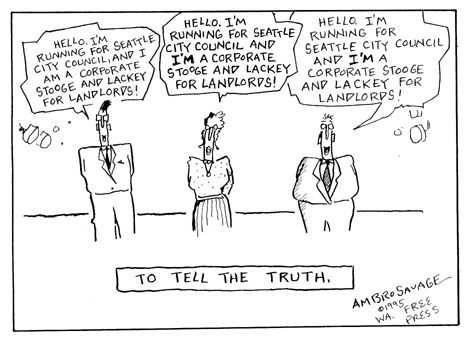We also need more issue-based initiative campaigns that could force the City to adopt aggressive housing policies and reallocate resources from downtown to our neighborhoods. Pursuing any progressive strategy, however, will depend upon more active involvement from those who are not represented by the status quo - young people, working class people, communities of color, poor and homeless people, and senior citizens. We need more of these constituencies willing to press their case not just at the ballot box but in the form of good old fashioned protest.
To contact The Seattle Displacement Coalition, call: (206) 523-2569.

Sherry Harris: People's Candidate or Landlord Lackey?
by Lisa Herbold
When Sherry Harris ran for City Council in 1991 she presented herself as a candidate for all citizens of Seattle. Many non-profit and community-based organizations endorsed and supported her candidacy. Whether or not Councilmember Harris has lived up to the expectations of her supporters is questionable in the light of the legislation she has sponsored, as well as her voting record.
Since Councilmember Harris took office in 1992 she has made numerous efforts to forge a relationship with the propertied classes of Seattle, often betraying her community supporters in the process. Her betrayal of Seattle's housing movement has been especially acute. In 1993, instead of taking leadership and sponsoring initiatives to strengthen the rights of tenants, she sponsored a Landlord-Tenant Workgroup in an attempt to have us "just work together." But increasingly, she is working only for landlords. Last year, Harris sponsored and voted for changes to Seattle's Relocation Assistance Regulation Ordinance, which suspended the owner's requirement to contribute financial assistance to low-income tenants displaced due to renovation, demolition, or change of use. Harris's latest act of back stabbing is displayed by her efforts to add new "just causes," or reasons for eviction, to Seattle's Just Cause Eviction Ordinance.
Seattle's Just Cause Eviction Ordinance (JCEO) is the law that requires landlords to give tenants a good reason for eviction. This law is solid eviction protection that renters outside of the city limits do not have. If you are on a month-to-month tenancy and you live north of N. 145th or south of S. 100th your landlord can require you to uproot your home, yank your kids out of school and move, for no reason with only twenty days prior notice. These notices to terminate tenancy are frequently given in illegal retaliation against tenants who have exercised their legal rights. No-cause terminations are also often used to discriminate against tenants because of their race, sexual preference, age, gender, family size, or disability.
Landlords are using their influence with Harris to weaken the law. If they are successful the number of reasons for eviction will be increased from 14 to 22. One proposed "just cause" for eviction will be allegation of criminal activity. Instead of going to court to prove that the tenant is doing something wrong, the landlord can simply give a 20 day notice to vacate. This change, if approved, will make it much easier for landlords to ask tenants they perceive as "troublemakers" or those they wish to discriminate against to move based upon the allegation, but not proof of criminal activity.
The one thing Harris has successfully accomplished over the last four years is positioning herself for reelection. Harris has gained the support of those with deep pockets to replace the broader support she has lost. A comparison of Sherry's campaign contributions makes evident that shift of support. In 1991 Harris received campaign contributions from organizations such as NOW, the Lesbian Political Caucus, the Women's Political Caucus, and the Seattle Firefighters Guild, as well as unions and community activists. This time around her campaign contributions come increasingly from interests such as Boeing, Philip Morris, US West, Burlington Resources (an oil and gas PAC), Sabey Corporation (a commercial real estate PAC), as well as a handful of Seattle's landlords. The landlords who have contributed to her campaign are part of the Apartment Association of Seattle and King County (AASK), a lobby of landlords who have been instrumental in pressuring the city to dismantle, one by one, the good laws that protect Seattle's renter community.
Fifty-two percent of Seattle's residents are tenants. When at the polls, make sure that you vote for a candidate who is supporting your, as well as the majority of the city's, interests.
To contact the Seattle Tenants' Union call (206) 722-6848.
[Home]
[This Issue's Directory]
[WFP Index]
[WFP Back Issues]
[E-Mail WFP]
Contents on this page were published in the August/September, 1995 edition of the Washington Free
Press.
WFP, 1463 E. Republican #178, Seattle, WA -USA, 98112. -- WAfreepress@gmail.com
Copyright © 1995 WFP Collective, Inc.






